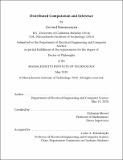Distributed computation and inference
Author(s)
Ramnarayan, Govind.
Download1191230380-MIT.pdf (2.322Mb)
Other Contributors
Massachusetts Institute of Technology. Department of Electrical Engineering and Computer Science.
Advisor
Elchanan Mossel.
Terms of use
Metadata
Show full item recordAbstract
In this thesis, we explore questions in algorithms and inference on distributed data. On the algorithmic side, we give a computationally efficient algorithm that allows parties to execute distributed computations in the presence of adversarial noise. This work falls into the framework of interactive coding, which is an extension of error correcting codes to interactive settings commonly found in theoretical computer science. On the inference side, we model social and biological processes and how they generate data, and analyze the computational limits of inference on the resulting data. Our first result regards the reconstruction of pedigrees, or family histories, from genetic data. We are given strings of genetic data for many individuals, and want to reconstruct how they are related. We show how to do this when we assume that both inheritance and mating are governed by some simple stochastic processes. This builds on previous work that posed the problem without a "random mating" assumption. Our second inference result concerns the problem of corruption detection on networks. In this problem, we have parties situated on a network that report on the identity of their neighbors - "truthful" or "corrupt." The goal is to understand which network structures are amenable to finding the true identities of the nodes. We study the problem of finding a single truthful node, give an efficient algorithm for finding such a node, and prove that optimally placing corrupt agents in the network is computationally hard. For the final result in this thesis, we present a model of opinion polarization. We show that in our model, natural advertising campaigns, with the sole goal of selling a product or idea, provably lead to the polarization of opinions on various topics. We characterize optimal strategies for advertisers in a simple setting, and show that executing an optimal strategy requires solving an NP-hard inference problem in the worst case.
Description
Thesis: Ph. D., Massachusetts Institute of Technology, Department of Electrical Engineering and Computer Science, May, 2020 Cataloged from the official PDF of thesis. Includes bibliographical references (pages 319-331).
Date issued
2020Department
Massachusetts Institute of Technology. Department of Electrical Engineering and Computer SciencePublisher
Massachusetts Institute of Technology
Keywords
Electrical Engineering and Computer Science.